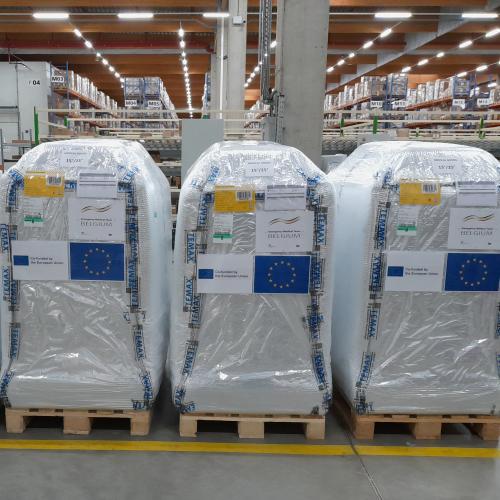
Belgian rescEU hub channelling aid to Ukraine
The rescEU hub in Belgium is working with the private sector to channel essential aid to Ukraine.

From the very start of Russia’s war of aggression in Ukraine, people have been asking ‘How can I help?’. Some want to donate time or money to support refugees arriving from Ukraine in other countries, while others want to know what essentials they can send to help support people still in Ukraine and contribute to alleviating their suffering.
Companies wanting to help got in touch with the European Commission’s Department for Crisis Management to offer goods and ask how to get them to Ukraine. When the private sector and other large organisations get involved in responding to a crisis, the impact is bigger, but so are the logistical challenges.
Cristian Giménez Payo is from the rescEU donations team at ECHO. He said: “After the outbreak of war in Ukraine, we started to receive offers from companies hoping to help by donating goods for Ukrainian people. We decided to organise this at EU level. ECHO offered to coordinate the process and channel the offers, and Belgium offered its support.”
The hub for Ukraine in Aalst, Belgium is run by Belgium’s Federal Public Service Health (FPS) and civil protection authorities, and supported by rescEU. Set up to help private companies send their donations to Ukraine, it will be operating until the beginning of 2024, at least.
When a company offers goods for Ukraine or its neighbouring states, Belgium hosts the donation temporarily, both physically and as a temporary ‘owner’ of the goods until they reach Ukraine. The Belgian authorities do the administrative and logistical work, host the capacity goods in their warehouse, and arrange transport of the goods from their warehouse to Ukraine.
The hub manages goods ranging from medical equipment, personal protective equipment (PPE), medicines, and chemical, biological, radiological and nuclear (CBRN)-related items. More than 7.5 million items, with a value of around 5 million euro, have been delivered to Ukraine so far through the Aalst hub.
This is a very good example of public-private cooperation. We have gained a lot of experience, and as of now, there have been 17 successful donations including seven in the category of medicines, four medical devices donations and six ‘others’ such as PPE and biocides.
Viviane Henry, Strategic Advisor in Crisis Management Belgium, FPS, said: “This pilot project has opened doors allowing private companies to donate through the UCPM framework. Like with any new project, challenges were met during this past year, but nothing that couldn't be resolved by the different partners involved. We have gained a lot of experience, and as of now, there have been 17 successful donations including seven in the category of medicines, four medical devices donations and six ‘others’ such as PPE and biocides.”
The pilot has yielded good results and possibilities for future activities. Viviane added: “In total we’ve received 629 pallets of products and delivered them to EU hubs near the Ukrainian border. However, we hope this is just the beginning and that in the future we can help channel many more donations to support Ukraine. This is a very good example of public-private cooperation. Belgium supports future initiatives allowing the public authorities to enhance relations and build trust with the private sector.”
Companies interested in donating can check an up-to-date list of what is needed and contact ECHO-Donations@ec.europa.eu about the next steps.
Russia’s war on Ukraine has severely affected emergency healthcare in the country, while in neighbouring countries, refugee inflow has put hospitals under strain.
The EU Medevac Hub near Rzeszów, Poland has one of the closest airports to Ukraine, and provides care for patients from Ukraine before their transfer to other countries for further treatment.
The EU energy hub in Poland is delivering power generators and other energy items to Ukraine, helping the country sustain its electricity supply in the midst of Russia’s deliberate attacks on its energy infrastructure.
The generators range from small models capable of powering single households to much larger models suitable for keeping public buildings and vital community services like hospitals and central heating points running.

The Knowledge Network editorial team is here to share the news and stories of the Knowledge Network community. We'd love to hear your news, events and personal stories about your life in civil protection and disaster risk management. If you've got a story to share, please contact us.